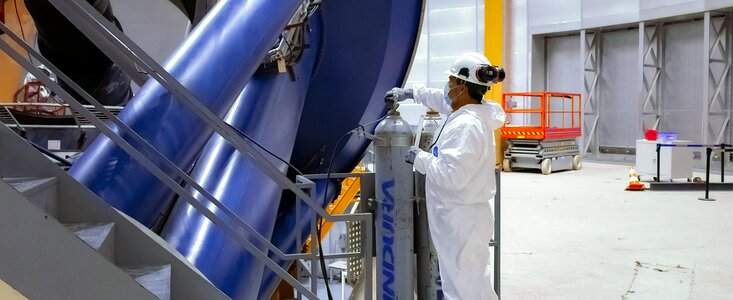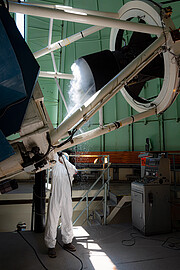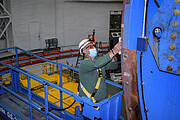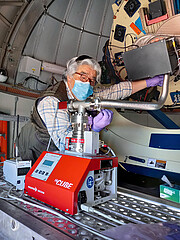NOIRLab Update on COVID-19 Implications
7 December 2020
7 December 2020
Following is an update on the impact of the COVID-19 pandemic on NSF’s NOIRLab.
Starting in mid-October 2020, science operations conducted with limited staff were re-established at Kitt Peak National Observatory (KPNO) in Arizona and at the Cerro Tololo Inter-American Observatory (CTIO), Gemini South, and SOAR facilities in Chile after their suspension on 18 March 2020 because of the COVID-19 pandemic. In addition, since mid-May 2020, the Gemini North telescope has been conducting observations from Maunakea.
At KPNO, the Nicholas U. Mayall 4-meter Telescope and WIYN 3.5-meter Telescope, as well as a number of tenant facilities, have restarted limited nighttime operations. The focus has been on continuity of the Dark Energy Spectroscopic Instrument (DESI) and NEID instrument commissioning. We are currently able to continue science operations at KPNO while following all public health guidelines and our rigorous safety protocols developed over the past eight months, and are closely monitoring the situation in Arizona.
In Chile, at CTIO, the Víctor M. Blanco 4-meter Telescope restarted limited operations with the Dark Energy Camera (DECam) on 11 October 2020, while the SMARTS 1.5-meter Telescope resumed operations with Chiron on 11 November. All of the robotic tenant facilities are also back in operation, while the KMTNet 1.6-meter Telescope will start up in early December when the Korea Astronomy and Space Science Institute’s (KASI) telescope operators can return to work on site.
At SOAR on Cerro Pachón, the telescope and the Goodman spectrograph resumed science operations on 7 October and these are continuing. Subsequently, all SOAR instruments have been prepared for use, and all instruments scheduled for the remainder of the semester have been checked on-sky, now including science observations. Observations have been performed with SIFS, HRCam, SAM, Spartan and TripleSpec, plus a complete day-time check-out with the SOAR Imager (SOI). Auxiliary capabilities (guiders, ADC, calibration WF sensor) have all been brought into operation as well.
Gemini South operations resumed on 20 October 2020. The telescope and its instruments continue to work well and the weather has been favorable, so good progress has been made on the observing queue. The new GHOST instrument will be moved to the summit and unpacked in December, although installation and commissioning must wait until it is safe to complete.
Gemini North in Hawai‘i has been operational since the night of 19 May 2020. The team just completed a major telescope maintenance shutdown with a crew of only five staff. Science operations resumed after the maintenance shutdown but have been impacted by the onset of northern hemisphere winter weather. At both Gemini North and South, proposals will be considered for Director’s Discretionary Time and the Fast Turnaround monthly process.
Limited construction activities on Cerro Pachón in Chile for Vera C. Rubin Observatory, in compliance with COVID-19 protocols, resumed on 28 September 2020. The Commissioning Camera, which has been at the base facility in La Serena since May because of COVID-19 restrictions on the summit, was moved to Cerro Pachón on 16 November 2020, where it will be installed on the third level of the summit facility.
NOIRLab is extending its closure of public visits and face to face educational events until at least 1 June 2021. NOIRLab's Communications, Education & Engagement group has responded to the COVID-19 pandemic by creating a variety of virtual experiences for parents, teachers, students and the general public. These programs take a variety of forms, including pre-recorded videos highlighting NOIRLab science and education programs and live video events featuring NOIRLab staff and scientists. The best way to find out when these programs are offered is to follow NOIRLab social media channels or consult our website.
NOIRLab’s teleworking policy remains in effect at all sites for all staff who can work remotely. NOIRLab will continue to closely monitor all factors influencing the restart of operations and will act according to the latest health and safety considerations at each location.
More information
NSF’s NOIRLab (National Optical-Infrared Astronomy Research Laboratory), the US center for ground-based optical-infrared astronomy, operates the international Gemini Observatory (a facility of NSF, NRC–Canada, ANID–Chile, MCTIC–Brazil, MINCyT–Argentina, and KASI–Republic of Korea), Kitt Peak National Observatory (KPNO), Cerro Tololo Inter-American Observatory (CTIO), the Community Science and Data Center (CSDC), and Vera C. Rubin Observatory. It is managed by the Association of Universities for Research in Astronomy (AURA) under a cooperative agreement with NSF and is headquartered in Tucson, Arizona. The astronomical community is honored to have the opportunity to conduct astronomical research on Iolkam Du’ag (Kitt Peak) in Arizona, on Maunakea in Hawaiʻi, and on Cerro Tololo and Cerro Pachón in Chile. We recognize and acknowledge the very significant cultural role and reverence that these sites have to the Tohono O'odham Nation, to the Native Hawaiian community, and to the local communities in Chile, respectively.
Contacts
Amanda Kocz
Press and Internal Communications Officer
NSF’s NOIRLab
Cell: +1 626 524 5884
Email: amanda.kocz@noirlab.com







